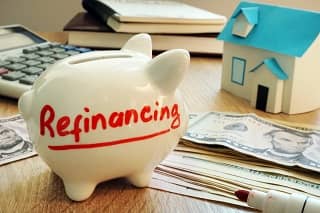If your goal is to pay off your mortgage early or reduce the amount of interest you're paying over the life of your loan, you may be better off making extra payments to your principal than starting over with a new loan. A new loan may require paying mortgage fees all over again, and re-starting the loan term all over can bring higher long-term costs, too.
On the other hand, prepaying your mortgage carries no costs and serves to shorten the remaining term of your loan, bringing real savings over time. To show you how prepaying versus refinancing can benefit you, HSH.com has two unique calculators that can help show you how prepayment produces refinance-like savings.
"The PreFi Calculator might be a compelling tool for someone who has a small loan balance, someone with less than 10 years left on their loan, or someone who can't qualify for a new mortgage," says Keith Gumbinger, vice president of HSH.com. "If you have a old loan at a 6 percent interest rate you might think you should refinance into a lower rate, but refinancing is not convenient and it's not free. Instead, you prepay your mortgage; how much you want to send each month is up to you, and you can use the calculator to determine the amount of interest savings and the effective interest rate you create via your prepayment."
The effective interest rate you create via prepaying is the equivalent to refinancing your mortgage to that interest rate.
If you're interested in achieving the effect of a targeted lower interest rate, for example attaining the same savings from refinancing from a rate of 3.5 percent to 2.25 percent, you can use the LowerRate Prepayment Calculator to show exactly how much more you need to add to your monthly payment to reach the same level of interest savings as a refinance to that 2.25 percent rate.
Gumbinger says extra payments should be made separately and denoted as a prepayment with your loan number to be certain the payment is credited.
But for whom is prepayment better than refinancing? There are a number of homeowners who fall into this group.
Your loan balance is too small to refinance
Doug Benner, a senior loan officer with First Heritage Mortgage in Tampa, Fla. says borrowers with a larger loan balance can often qualify for a "no-cost" refinance in which the lender pays the closing costs and in exchange receive a 0.25 to 0.5 percent higher interest rate offer. But for borrowers with small-balance mortgages, that's not usually the case.
"If your loan balance is too small it's hard to find a lender who will do a no-cost refinance because they just won't make enough money off the loan," says Benner. "In that case, it makes more sense to prepay your loan instead of paying to refinance." Some lenders won't refinance small-balance loans regardless of how the fees are paid; from their perspective, it's the same amount of paperwork for a million-dollar loan as a $50,000 one, so one has much greater value to them than does the other.
Refinancing costs about two percent of your loan amount or more in some areas, so even if you qualify to refinance you may not want to spend that cash, says Gumbinger. On a percentage basis, fees can be higher for a small loan; for example, $5,000 in closing costs is 2 percent of a $250,000 loan -- but 6.25% of an $80,000 loan.
"If you can't refinance because your balance is too low or for some other reason, then prepayment is a good idea," says Benner. "A prepayment calculator can help you figure out how much to pay each month to reach a specific goal."
It's just not worth it to refinance
A small differential in rate between your existing loan and a new loan may be a deterrent to refinancing, since it may take a long while to achieve meaningful savings even if you pay no fees out of pocket.
Gumbinger says borrowers who refinanced into a 3.5 percent loan last year may be tempted by a 3 percent loan but decide it's not worth it to refinance.
"If you took the cash you were going to spend on closing costs and apply that to the principal balance, then you may be able to achieve close to the same impact as a refinance, if a small one," he says. In addition, and depending on how long you remain in the new loan "you may or may not ever achieve the savings you hoped for."
For example, if you have an $80,000, 3.5% 30-year mortgage taken out in July 2017 and were considering refinancing it in December of 2020, typical closing costs of 2% of the remaining loan amount ($74,525) would set you back about $1,490. If you made a lump sum payment of that $1,490 with the 42nd payment in December 2020, you could achieve the same total interest costs as refinancing to a new rate of 3.361% over the remaining 318 payments.
Rather meter out the cash slowly? If instead you paid that $1,490 over the remaining 318 loan payments at $4.69 per month -- nearly painless prepayment -- you could lower your loan's effective interest rate to 3.441 percent without refinancing. Of course, If you can make a larger regular commitment -- say, $25 per month instead -- you can trim down your loan's 3.5% rate to an effective interest rate of just 3.162% -- about a 3/8% reduction in cost -- all without getting a new mortgage.
Prepaying when you can't qualify for a mortgage refinance
Mortgage underwriting conditions change from time to time, sometimes abruptly. So too can your financial situation, and changes in your credit or interruptions in your income stream (or irregular income) may leave you misaligned with today's qualification requirements, and you won't be able to refinance. However, if your income will allow it, prepaying your mortgage can bring you the same savings as a refinance over time without needing to qualify, spending any money on loan fees or producing any documentation.
In today's mortgage market, it can be difficult or even impossible for homeowners outside the mainstream to find a refinance, but prepaying the mortgage remains a viable path to achieve savings even when a refinance is not.
Disadvantages of prepayment
"Prepaying your mortgage will indeed save interest costs, but it may negatively impact net worth," says Rich Arzaga, founder of The Real Estate Whisperer Financial Planning in Monument, Colo. "You may be better off putting more money into your retirement investment rather than paying down your loan."
Arzaga says that prepayment of your loan provides a guaranteed return on investment equal to your interest rate, such as 5.5 percent on a loan with a 5.5 percent mortgage rate.
"But if a borrower's growth earned on additional 401(k) contributions is 7 percent, then the client has lost 1.5 percent by prepaying. Over time, this is significant."
Instead of putting extra cash toward your loan balance, Arzaga says homeowners should first consider other uses of money that could be used for mortgage prepayment, such as whether they should be saving more for retirement, paying down credit card debt or buying life insurance, disability insurance or long-term care insurance with the money.
If, however, you have all those expenses covered and would like to retire your mortgage faster, then prepaying your loan could shave years off your loan and save you thousands.
"It may seem counterintuitive, but paying more each month to spend less over time can be a smart move," says Gumbinger.
Related links :
- Mortgage calculator
- HSH's comprehensive guide to prepaying your mortgage
- Refi Calculator - Traditional, Low Cash Out & No Cost Options
Keith Gumbinger updated and revised this article.



